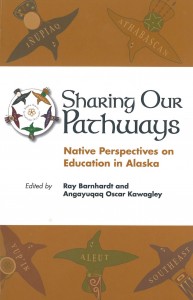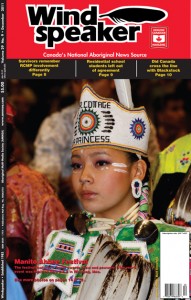This important book was published in May 2011 as the Alaska Native Knowledge Network prepared a collection of essays derived from articles first published by the Alaska Rural Systemic Initiative’s (AKRSI) newsletter publication Sharing Our Pathways. The primary purpose of AKRSI was to systematically document native ways of knowing, the Indigenous knowledge systems used by Alaska Native people and use this information to develop curricula to be taught in Alaska’s schools. Sharing Our Pathways: Native Perspectives on Education in Alaska was edited by Ray Barnhardt and Angayuqaq Oscar Kawagley. Dr. Barnhardt is Director of the University of Alaska Fairbanks Cultural Studies Department. The late Dr. Kawagley, who passed this April, conceived the notion of using indigenous methodology to teach students in the schools. Kawagley and Barnhardt worked closely together for many years to foster the use of cultural and curriculum resources developed by AKRSI. Sharing Our Pathways is broken into five pathways to education that each represents values held by the Athabascan, Iñupiaq, Tlingit/Haida, Unangan/Alutiiq and Yup’ik/Cup’ik peoples.
Month: November 2011
In this article, the author Lousie Amways (2007) explores the cultural beliefs, values and practices of indigenous people. She discusses how these systems have contributed to the sustainability of the culture and to their lives in general. Focusing on the needs of the children, she addresses the important role of the school in maintaining cultural values and practices. She further points out the need for support and respect for the people and a safe place in which to continue their cultural practices in a traditional society. The article outlines the destructive influence of interaction with traditional society and advocates for the strengthening of culture. Her presentation on suggested strategies for the classroom in helping to build strong identity in the children as well as reinforcement activities to strengthen the culture gives insight into the existing challenges of the education system to meet the needs of different learning communities, especially the indigenous people.
http://www.louisesamways.com.au/pdf/CulturalValuesVsPractice.pdf
This organization is the brain child of the College of Education designed to generate research activities in Aboriginal education. Geared mainly towards the people of Saskatchewan, the center focuses on achieving success in the teaching and learning activities of that community. Through collective partnership of different stakeholders in education they aim to build a better united force within the community. Through the Centre’s course offerings and capacity training exercises it is hope that they will transform education and stimulate aspirations among Aboriginal people and let their voices be heard and understood across the wider landscape of society.
The site demonstrates its mandate with the provision of a wealth of resource material, up to date information on happenings in the region, photos, articles, research material and a host of other valuable information including links to various university programs and associations within the region.
http://aerc.usask.ca/decolonization.html#_ftn1
Module 4 Sites
Windspeaker-Canada’s National Aboriginal Newsource
http://www.ammsa.com/publications/windspeaker
This publication is very broadly distributed throughout all of Canada. The editorials and submission pieces come from writers nationally. They focus on current events, music and art and personal pieces. Links are available to other Canadian publications and Aboriginal radio stations. I really liked the section on health and book reviews – point of view pieces and experts providing information and advice on a plethora of projects.
First Nation’s Education Steering Committee
http://www.fnesc.ca/publications/index.php
An independent society that focuses’s on improving education in British Columbia. The links are an excellent support for learners, parents, and educators. There is also a focus on news releases with editorial reviews to delve deeper into issues that are being identified. The publications page has a search engine to research topics and reports related to Aboriginal education.
First Nation’s School Association
At first glance, I noticed that these pages from FNSA really centred on progressive education for First Peoples. I really found the current events section of the site extremely informative. And there was also a publications centre which has a variety of articles, papers and publications. They have a lending library! This is a fabulous resource that I haven’t seen before. There is also, a special needs resource toll free hotline for parents, educators and administrators who are seeking advice or connections. To have full access to all publications and services you do need to become a member or associate member but it would be immensely worthwhile to undergo that process.
National Centre for Firsts Nations Government
http://www.fngovernance.org/publications/index.htm
NCFNG site contains an enormous amount of articles for all Canadian to learn and understand to process involved in the First Nations Government process. There are research publications, governance best practice reports, and presentations of findings. It is a trans-national site from BC to the Atlantic Provinces that is fabulous at detailing information for support and services for communities and youth engagement. You can find commentary that is specific for your centre or you can garner a better understanding of issues and events in other areas of Canada. They have offices in each area for support.
FNS is a very professional set of pages that has live webcast broadcasts from Chiefs and community members nationally and internationally. The references available include editorials, and FNS press releases. I was really intrigued by the current events section which included the FNS presentation to the BC Missing Women’s Inquiry which is available in pdf format. As you scroll through the pages, it is a great option to look at the videos from Grand Chief Edward John as he speaks to a variety of organizations including but not limited to; the United Nations and a National China Trade groups.
Indigenous Education and Environment
The website, Asia Indigenous Peoples CCMIN (Climate Change Monitory and Information Network) has as one of its partners, Indigenous Peoples’ Foundation for Education and Environment (I.P.F) that was officially launch in November 2005 to meet the needs of the indigenous community. The aim of the group is to “best serve the need of its target communities particularly on issues of indigenous peoples’ education, self-determined development and customary land use and natural resource management.” The site provides a wealth of resources and articles which details of the policy changing efforts and case studies of unhealthy environmental practices. Overwhelming information on environmental and land issues can be examined as well as guides into capacity building exercises.
http://ccmin.aippnet.org/index.php?option=com_content&view=article&id=189&I
temid=146
Difference in Culture
This webpage is authored by the Department of Indigenous Affairs in the Government of Western Australia. It details the difference between aboriginal and mainstream culture as it relates to education, death and individualism. Lifestyle traditions are also discussed with additional links provided on Aboriginal kinship. From this site information can be gleaned on the uniqueness of aboriginal culture and heritage and provides visitor the unique opportunity of examining how simplicity, care and respect has governed their lifestyle and survival when compared to mainstream way of life.
http://www.dia.wa.gov.au/en/Heritage-and-Culture/Aboriginal-culture/Lifestyles-and-traditions/Aboriginal-culture-versus-Western-society/
Crossing Borders
This site Mission Aviation Fellowship (MAF) site details the offerings of a group of Christians who seek to share their love for Christ by reaching out and transforming isolated people. Using their skilled personnel and “out of the box” technology application they provide training in aviation and technology to indigenous people in many regions across the globe. Complete with resources such as news briefs, photos, videos and newsletters views are provided with exciting information about their work and accomplishments. This site shows that there is hope for indigenous people as persons continue to bridge the distance of time and space with the use of technology to realize the hope for parity.
1. Indigenous Culture and the Western Concept of Development
http://www.fountainmagazine.com/article.php?ARTICLEID=74
This site reflects an article written by Imran Sabir which gives an insight into the Indigenous and the Western cultural concepts of development. The article first clearly explains the meaning of the key terms development and culture. It further suggested how development and culture would be defined by the Indigenous and westehe articles also outlined the problems associated with both type of development and possible solution. The effect of globalization and technological advancement in western societies were also looked at.
2. Defining People Differently: Claiming Space for Aboriginal Diversities In Contemporary Canada
http://www.canadian-studies.net/lccs/LJCS/Vol_16/NorrisNicholson.pdf
This article was written by Heather Norris Nicholson from Birkbeck College and published in London journal of Canadian Studies 16:2000/2001. Her academic paper looked at the relations of the culture, socio-economic status and politics of Canada’s Indigenous people and the people of the rest Canada over decade. This paper emphasized on the issues based on the following:
• Conflict to Reconciliation and Healing;
• Life-skills, Enterprise and the Language of Survival Economics;
• The Languages of Restitution, Recovery and Cultural Autonomy
3. “Ideas for Cultural Videoconferencing in the Cairns Area (Northeastern Australia)”
http://www.storytellingandvideoconferencing.com/44.html
This are article was written in 2005 by Eric Miller,an American. In his article he discussed the roles that videoconferencing can play the cultural preservation of Aboriginals in the Cairns area of Australia. He stated that videoconferencing is a good way in which people across the globe can interact with Aboriginal people and become expose to their language.
4. Taking Ownership: Strengthening Indigenous Cultures and Languages through the Use of ICTs
http://learnlink.aed.org/Publications/Concept_Papers/taking_ownership.pdf
This article looked at the ways in which ICT can strengthen the indigenous culture and broadcast it to the rest of the world. The article clearly outlined areas in which technology helped the culture of the indigenous people. It also mentioned that ICT can have both negative and positive effects on indigenous people. However, the article mainly focused on the positive effects. Some of the points highlighted in the article include:
• The integration of ICTs and indigenous cultures;
• The use and the effect ICTs in indigenous communities;
• The national policies and access initiatives of ICTs;
• Technology as a vehicle to share knowledge across boundaries ;
• Bilingual Indigenous Education and technology.
5. ICTs AND INDIGENOUS PEOPLE
http://iite.unesco.org/pics/publications/en/files/3214689.pdf
This article displays a brief overview of policies on the use of technology among indigenous people. These policies were developed by the UNESCO in June 2011. The policies clearly outlined recommendations that follow the guidelines of United National Declaration of the Rights of Indigenous Peoples. The article highlighted some major points which include the following:
• The importance of indigenous knowledge;
• The critique of the policy option;
• The erosion of indigenous people’s culture by ICTs;
• The reinforcement of indigenous culture and knowledge by ICTs;
• Effective ways that ICTs can support indigenous education and culture.
ICTs and Indigenous People
http://iite.unesco.org/publications/3214689/
This website consists of vital information that will help me effectively develop my research paper. The website presents the IITE Policy Brief report that acknowledges Indigenous people lack of access to information and communication technology resources which contributes to the digital exclusion they are faced with. The paper highlights the challenges that contributes to this issue and also provide examples of models used across the globe that can be used by indigenous peoples to strengthen and reinforce indigenous knowledge and culture and provide more culturally responsive learning resources and environments for their children.
http://project.it.uts.edu.au/ipit/CulturalIssuesInIndigenousAustralianAdoptionOfICT.pdf
This website presents a paper that examines issues that Indigenous Australians face in relation to information and communications technology. The paper examines the impact of Western values on Indigenous people and also explores possible challenges that cause the low adoption rate of ICT use and implementation in indigenous communities. In addition, the paper highlighted ways that ICTs are implemented in indigenous communities to help preserve and maintain their culture.

